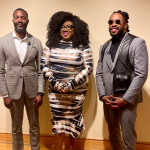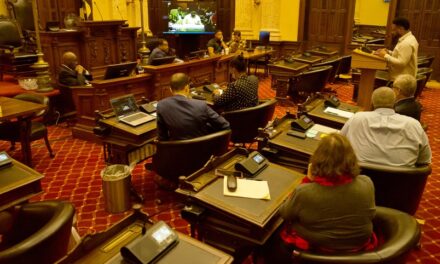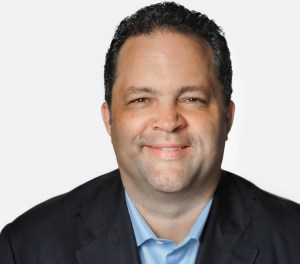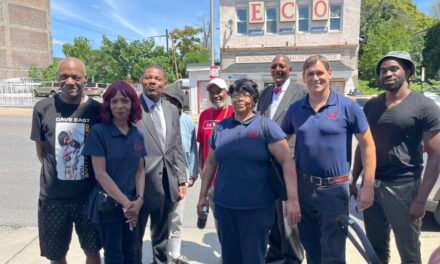From left: Birmingham Mayor Randall Woodfin; BCRI President and CEO DeJuana Thompson; Singer/Songwriter Raheem DeVaaugh. (Je’Don Holloway Talley, For The Birmingham Times)
” data-medium-file=”https://www.birminghamtimes.com/wp-content/uploads/2024/04/LoveLife-1a–300×198.png” data-large-file=”https://www.birminghamtimes.com/wp-content/uploads/2024/04/LoveLife-1a-.png” />
By Je’Don Holloway-Talley | For The Birmingham Times
Grammy-nominated singer/songwriter Raheem DeVaughn was in Birmingham last week to not only perform at the Alabama Theatre but also to give back.
One day after performing on Wednesday, DeVaughn’s LoveLife Foundation presented the Let’s Talk Women’s Empowerment Luncheon. which assembled elected officials, artists, advocates, community leaders, and civic activists for a discussion on the health and mental well-being of Black women.
The exclusive conversation was held at the Birmingham Civil Rights Institute in the Odessa Woolfolk Gallery.
“… I’m one of those artists who believe that you don’t come to a city [and do a show] and just run off, the best thing you can do is some community work, and it allows me to party with a purpose,” said DeVaughn, during a press conference before the luncheon.
“… there is a plethora of things going on in the Black community [and] not all of it is negative, there are positives as well,” ,” he continued. “The Black woman has always been the backbone of the family, and when I think about my mother or grandmother, initiatives like this and these roundtable discussions are extremely important to me.”
DeVaughn said his ongoing ‘Let’s Talk’ series is designed to cultivate solutions for Black women in underserved communities.
“… the trajectory of youth, their outcomes, and success in life really depends on the happiness of the Black woman in the household,” he said. “When you talk about their level of stress or whether they come from a single household and [where the Black woman] is the breadwinner, all of these things we have to combat and deal with because women carry a lot whether you’re talking about women of color or women in general,” he said, “and I couldn’t think of a better initiative ….”
” data-medium-file=”https://www.birminghamtimes.com/wp-content/uploads/2024/04/LoveLife-2-300×185.png” data-large-file=”https://www.birminghamtimes.com/wp-content/uploads/2024/04/LoveLife-2-1024×633.png” class=”size-full wp-image-119221″ src=”https://www.birminghamtimes.com/wp-content/uploads/2024/04/LoveLife-2.png” alt=”” width=”1130″ height=”698″ srcset=”https://www.birminghamtimes.com/wp-content/uploads/2024/04/LoveLife-2.png 1130w, https://www.birminghamtimes.com/wp-content/uploads/2024/04/LoveLife-2-300×185.png 300w, https://www.birminghamtimes.com/wp-content/uploads/2024/04/LoveLife-2-1024×633.png 1024w, https://www.birminghamtimes.com/wp-content/uploads/2024/04/LoveLife-2-768×474.png 768w, https://www.birminghamtimes.com/wp-content/uploads/2024/04/LoveLife-2-680×420.png 680w, https://www.birminghamtimes.com/wp-content/uploads/2024/04/LoveLife-2-640×395.png 640w, https://www.birminghamtimes.com/wp-content/uploads/2024/04/LoveLife-2-681×421.png 681w” sizes=”(max-width: 1130px) 100vw, 1130px” />
BCRI CEO and President, DeJuana Thompson hosted the roundtable luncheon.
“We always want to be the kind of place that opens its doors to learning, addressing issues of our day, and showing where there are disparities and also where there are opportunities,” Thompson said. “We’re excited to talk about the fact that there is something we can do. We want to be solution-makers … and anytime we can do that I’m always on board,” she said at the press conference held before the event.
The discussion circled topics concerning Black women and domestic violence, HIV/AIDS and its alarming statistics among Black women, teenage girls, mental health, birth and health equity, community resources and programming for children and teens.
Mayor Randall Woodfin noted during the press conference that single women head a majority of Birmingham City households.
“This issue of health and HIV for Black women in a city like Birmingham where 60 percent of the households are led by women is an important topic…[and] gathering to talk about an issue that’s not only sensitive but relevant to our community is [crucial],” said the mayor.
Jefferson County Commissioner Shelia Tyson, who also Co-Convenor of the Alabama Black Women’s Roundtable, said the gathering was important because “no one is addressing the mental health of the woman, or the working poor in the state of Alabama who make $7.25 [an hour], where rent in the [poorest] communities [average] $900. No one is talking about the impact [poverty has] on mental health…
“Mental health is so important in our communities. Mental health is the key to success, and with it comes health, wealth, stability, education, and housing because you need your mind to [achieve success] because winning is a state of mind,” she said.
Present for the luncheon were representatives from AIDS Alabama, ACLU Alabama, Birmingham City Schools, mental health professionals, media personalities and Gilead Sciences, which is one of LoveLife Foundation’s biggest donors.
Samantha Granberry of Gilead Sciences “which is committed to advancing health equity, and in doing that we wanted to ensure that we partnered with authentic trusted voices of influence as is Raheem DeVaughn… who is not only as an artist but also as an activist,” she said.
“Through this partnership, we have had the opportunity in each of the 18 markets across the country to reach over 35,000 Black women in under 30 days around HIV awareness, education, empowerment, and most importantly local resources,” she added.
For more on the LoveLife Foundation visit Raheem DeVaughn’s LoveLife Foundation. For more on Gilead Sciences visit www.gilead.com.










